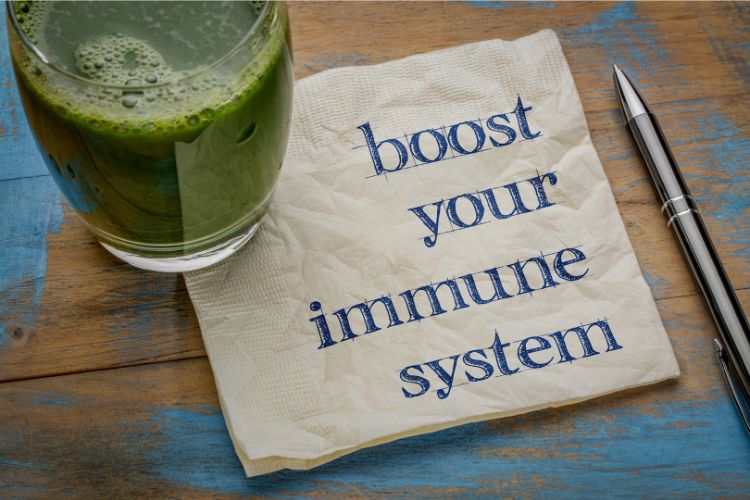
Simple Ways to Enhance Your Immune System
With the cold and flu season already in full swing, maintaining a strong immune system is vital to help keep you and your whole family healthy throughout the cooler months. Your immune system is your body’s natural defence mechanism against illness and while diet and a healthy gut are crucial in boosting immunity there are also several lifestyle choices you can make to ensure it functions optimally. Strong immune function not only helps you to ward off pathogens but also plays a key role in helping you to recover quicker should you pick up a bug. If you’re looking at how to enhance your immune system, these are some straightforward and effective ways to give it a boost naturally.
Eat a Diet High in Colourful Fruits and Vegetables
Incorporating a rainbow of fruits and vegetables into your diet is one of the best strategies for enhancing your immune system. These foods are rich in antioxidants, vitamins and minerals that help combat inflammation and protect your body against harmful pathogens. Aim for at least five servings a day with choices like blueberries, spinach, carrots and capsicum to get a broad range of nutrients.
Vitamins and minerals such as vitamin C, vitamin D and zinc play pivotal roles in boosting immune function. Vitamin C is known for its ability to support the cellular functions of both the innate and adaptive immune system, while vitamin D is essential for the proper functioning of T cells, an integral part of the immune response. Zinc, on the other hand, is crucial for immune cell development and can influence the body’s response to pathogens.
Avoid Sugars, White Flour and Excess Alcohol
Refined sugars and white flour (used in bread, pasta, biscuits and cakes) are low in nutritional value and can negatively impact your immune system by causing a spike in insulin levels and promoting inflammatory processes in your body. Similarly, excessive alcohol consumption can impair the immune system, making you more susceptible to infections. So when it come to how to enhance your immune system, opt for whole grains and naturally sweet foods and keep alcohol consumption to moderate levels.
Minimise Stress
Chronic stress is a known immune suppressor. Stress hormones inhibit the function of all aspects of immunity. This could result in worsened infections and slowed wound healing. It can disrupt your hormonal balance and lead to reduced white blood cell activity, which is crucial for fighting off infections. Managing stress through meditation, yoga, deep breathing exercises, or even engaging in hobbies you love can help keep your immune system functioning as it should.
Exercise Regularly
Physical activity is not just for building muscles or losing weight; it also boosts your immune system by improving your circulation and reducing stress. Regular, moderate exercise like brisk walking, cycling, or swimming can help the immune cells circulate through the body more efficiently, regenerate regularly and ensure your body’s defences are always at the ready. Regular physical activity can also help reduce inflammation. Aim for at least 150 minutes of moderate exercise per week.
Increase Water Intake
Staying hydrated is key to your body’s overall health, including the immune system. It helps to keep your mucous membranes, such as the linings of your nose, mouth and respiratory tract where viruses typically start, clear and fully functional. Water also helps in the production of lymph, which carries white blood cells and other immune system cells. Make sure to drink plenty of fluids every day; the amount can vary based on your lifestyle and environment but generally, 8-10 glasses are recommended.
Get Enough Sleep
Sleep has a profound impact on your immune strength by allowing the body to repair and regenerate its defences. During sleep, the production of cytokines is increased, which are essential proteins that help the immune system fight off infections and inflammation. Consequently, adequate sleep enhances the body’s ability to respond to illnesses and maintain overall health.
Lack of sleep can activate the stress response, depress immune function, and increase inflammatory chemicals. Adults should aim for 7-9 hours of good quality sleep per night to help support immune health. If you’re struggling to get a good night’s sleep, make an appointment with one of our qualified practitioners who can conduct tests including for melatonin deficiency, and help get o the root cause of your issue.
Supplement Your Diet Where Necessary
While a balanced diet is critical for supplying all the necessary nutrients to your immune system, sometimes you might need an extra boost. Supplements such as Vitamin D, Vitamin C, zinc and probiotics can be beneficial, especially during times when dietary intake might not meet daily needs. Always consult with a healthcare provider before starting any supplement regimen to ensure it’s safe and appropriate for your specific health circumstances.
When looking at how to enhance your immune system, by implementing these simple strategies, you can ensure that your immune function is robust enough to handle the challenges it faces. Remember, the key to strong immune function starts with taking proactive steps towards a healthier lifestyle. And if you need specialist support with nutrition, supplementation or lifestyle changes to keep you healthy all year round, make an appointment with one of the Perpetual Wellbeing practitioners today.
We offer Naturopathy and Nutritional Medicine consultations
at 2 convenient locations, Brisbane CBD and Graceville

